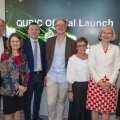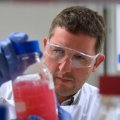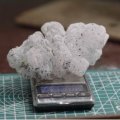Leading solar energy pioneer and The University of Queensland’s (UQ) Professor Paul Meredith has received the top honour at this year’s Premier’s Sustainability Awards.
Queensland Premier Campbell Newman and Environment Minister Andrew Powell congratulated Professor Meredith on receiving the award at a ceremony in Brisbane on Friday night.
Professor Meredith, who is the Clean Energy Program leader at the UQ Global Change Institute and Professor of Physics in the UQ School of Mathematics and Physics was recognised for his work investigating new high-tech materials to use for solar cells, electronics, sensors, displays and detectors, as well as his leadership role in UQ’s Solar Energy Research Program and commercialisation activities.
It is hoped Professor Meredith’s work will lead to applications in a range of technologies that improve the efficiency of solar energy harvesting systems and reduce power consumption of everyday high tech devices.
Professor Meredith said it was a great honour to receive the award.
“It’s wonderful to receive recognition for the work our team carries out at UQ. Their outstanding efforts over the past few years have created a world-class solar research capacity – both infrastructure and expertise,” Professor Meredith said.
“Our research is part of a long-term ambition for UQ in renewable energy development, including large-scale deployment of major clean energy-generating infrastructure.”
“We have many more projects in the pipeline and I see this achievement as an opportunity for UQ and the state of Queensland to be thought leaders in this space,” he said.
Professor Meredith said the Queensland Government should be commended for their long-held sustainability agenda, particularly in clean energy technology.
“They recognise the huge economic and sociological potential of being early adopters and technology leaders in this area,” he said.
UQ President and Vice-Chancellor, Professor Peter Høj, congratulated Professor Meredith, “whose entrepreneurial approach will help make the results of excellent research available for society, the economy and the environment”.
Director of the Global Change Institute, Professor Ove Hoegh-Guldberg said the award honoured some of the world’s “most significant” solar research from a researcher making a “huge impact”.
"We are very fortunate to have Paul leading our Clean Energy Program, which aims to address one of the greatest challenges of our time – the rapid rise of atmospheric carbon dioxide,” Professor Hoegh-Guldberg said.
“Paul’s work finding ways to limit the release of carbon dioxide is imperative if humans are to sustain life on the planet,” Professor Hoegh-Guldberg said.
Head of the UQ School of Mathematics and Physics, Professor Halina Rubinsztein-Dunlop, said the achievement exemplified the wide relevance of the work conducted at the school.
“Paul’s work is a prime example of the high impact, relevance and importance of innovative research carried out by a physicist,” she said.
Professor Meredith is the second UQ researcher with a sustainability focus to receive a Queensland Government distinction this month, after Deputy Vice-Chancellor (Research) Professor Max Lu, who was named a Queensland Great.
Media: Contact communications@uq.edu.au
About Professor Paul Meredith
Professor Paul Meredith is a Professor of Materials Physics in the School of Mathematics and Physics, Co-director of the Centre for Organic Photonics and Electronics and Vice Chancellor’s Senior Research Fellow. He is also focal area leader for Clean Energy in UQ’s Global Change Institute and is co-founder of the solar coatings companies Xerocoat and Brisbane Materials Technology. He served on the Premier’s Climate Change Council (2010-2012) and the Smart State Council Working Group on Evolving Energy Policy (2011-2012).
Professor Meredith leads an internationally recognised materials physics group, including RHD students in Physics and Chemistry working on projects such as organic solar cells and plastic electronics as well as the University’s solar research program. With a keen interest in alternative energy technology, Professor Meredith applies his scientific knowledge to help solve the world’s energy and climate change problems.
.jpg)












